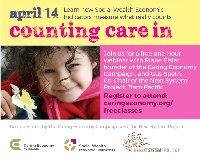
What Happens When We Count Care In?
March 28, 2016
Do you ever wonder why most of the world's poor are women and children? Why men occupy the majority of elected positions, corner offices, and seats around the conference table in the boardroom? Why women have most of the low wage and minimum wage jobs, and why jobs usually done by men pay more? If these questions interest you, consider signing up for a free one hour webinar on April 14 called "Counting Care In".
Well into the 21st century, most people assume that we are all competing on a level playing field, and that women's education and employment will deliver them to a roughly similar status with men. Yet, this is not the case. In 2016, men still do more paid work than women, and women do more unpaid work than men. It's the paid work that is tracked, measured and accounted for in our national record-keeping. The hours spent raising children, helping older parents with shopping or bill-paying, or taking care of family members with disabilities, don't get much attention from the suits in Washington, nor do they figure anywhere in our GDP. Even though our society, and our economy, totally depend on this work getting done, it remains totally invisible. That is a significant factor in women's greater poverty rates at every age in the US. It can also explain why we, unlike every other advanced economcy, have no nationally guaranteed paid leave for new parents or those caring for seriously ill relatives. We simply fail to value and account for care.
This is not inevitable, and it can be changed. Effective policies can be crafted and put in place. These same policies will advance business and promote our position in the global economy. "Counting Care In" is all about where care fits in the economy, and how measuring it encourages family economic security, fairness for working men and women, and a stonger nation for everyone. Webinar organizers describe it like this:
The key to a strong economy is caring for people and planet. Join Riane Eisler, founder of the Caring Economy Campaign and special guest Gus Speth, Co-Chair of The Next System Project, on April 14 at 2 PM EST, 11 AM PST for Counting Care In.
Register to attend: http://caringeconomy.org/valuecare/
This FREE 60-minute webinar introduces a new balance sheet to measure what really counts. Learn how Social Wealth Economic Indicators (SWEIs) are the foundation we need to support sounder policies and better lives.
Riane and Gus will discuss why we must have measures of economic success that include environmental, social, and political dimensions and how the Caring Economy Campaign’s proposed Social Wealth indicators go beyond other alternative economic measures to meet the care needs of 21st century families.
Join us April 14 and learn:
• How Social Wealth Economic Indicators can help build a strong economy that values and invests in the essential work of care
• How SWEIs provide the evidence-base you need to make the case for caring policies such as paid parental and sick leave, caregiver tax credits, better pay for care workers and educators, and increased investment in early childhood care and education
• How the SWEIs raise awareness around gender and care that make it essential to explicitly make those foundational dynamics visible.
Co-sponsored by The Caring Economy Campaign and The Next System Project. Questions: contact Ann: annamberg.cps@gmail.com



The views and opinions expressed in this post are those of the author(s) and do not necessarily reflect those of MomsRising.org.
MomsRising.org strongly encourages our readers to post comments in response to blog posts. We value diversity of opinions and perspectives. Our goals for this space are to be educational, thought-provoking, and respectful. So we actively moderate comments and we reserve the right to edit or remove comments that undermine these goals. Thanks!